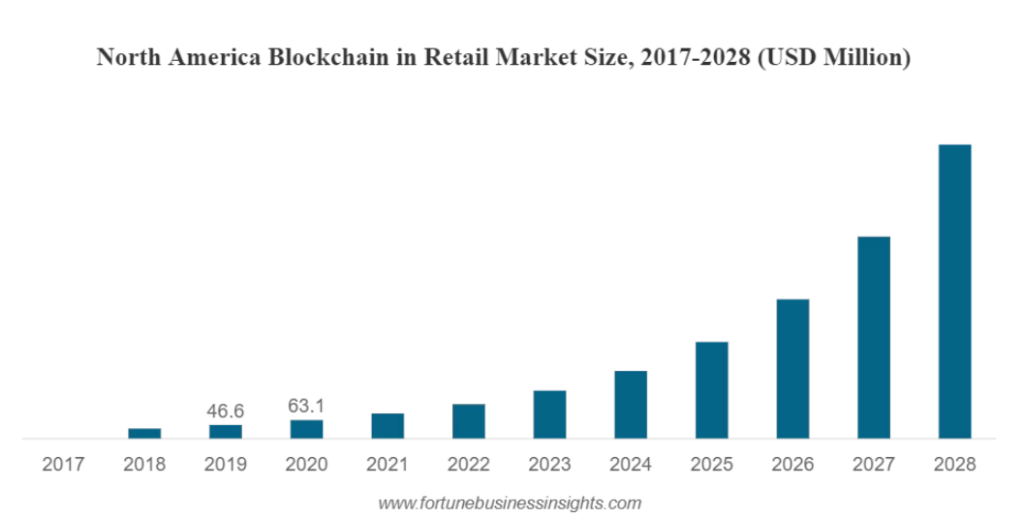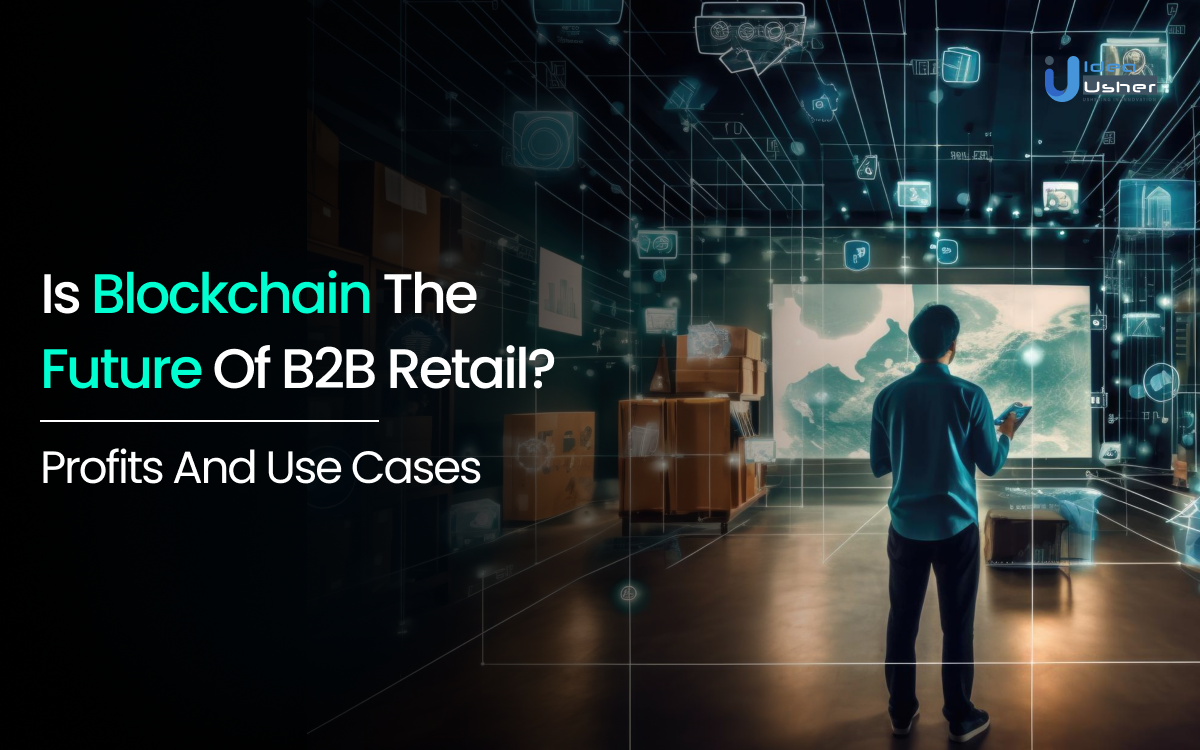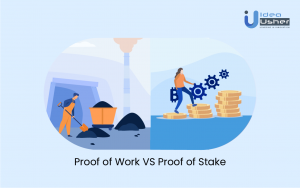The traditional B2B (business-to-business) eCommerce landscape, characterized by paper-based processes, opaque supply chains, and manual reconciliation, is transforming significantly. In today’s dynamic digital environment, these methods hinder efficiency and necessitate a more secure, transparent, and streamlined approach to B2B transactions.
Emerging as a transformative force, blockchain technology presents a compelling solution. It functions as a distributed ledger technology, essentially a secure digital record of transactions that is not stored on a single server but replicated and synchronized across a vast network of computers.
What is Blockchain in B2B Retail?
B2B retail is getting a significant upgrade. Blockchain, the secure digital ledger technology, is transforming how businesses interact. Imagine a system where every transaction, from product origin to payment confirmation, is transparent and tamper-proof. This fosters trust and streamlines operations by automating tasks and eliminating the need for intermediaries. Blockchain’s secure architecture also safeguards data, boosting security and revolutionizing B2B commerce.
Key Market Take-Aways for Blockchain in the Retail Industry

This translates to a compound annual growth rate (CAGR) of 42.8%, highlighting the rapid adoption of blockchain technology within the retail sector. Blockchain’s ability to enhance transparency, traceability, and efficiency across the supply chain is attributed to this growth. With the increased demand for these solutions, even COVID-19 has positively impacted the market.
What are the Key Challenges in B2B eCommerce?
The B2B eCommerce landscape, though established, faces a pressing need for modernization. While it facilitates business transactions, inefficiencies and limitations hinder its ability to flourish fully.B2B eCommerce requires significant improvements to remain relevant and efficient in the face of evolving customer demands and technological advancements. Here’s a closer look at the cracks in the foundation of B2B eCommerce:
1. Efficiency Erosion
Manual processes, paper-based workflows, and sluggish transaction times create bottlenecks that throttle operational efficiency. This frustrates customers and hinders the company’s ability to scale and compete effectively. Modernization efforts must prioritize streamlining workflows, automating tasks wherever possible, and implementing robust digital solutions to expedite transactions and reduce administrative burdens.
2. Shadows in Transactions
Opaque supply chains shrouded in secrecy hinder businesses from gaining real-time insights into the movement of goods. This lack of transparency makes it difficult to track the status of shipments, identify potential delays or disruptions, and ensure quality control throughout the supply chain. In today’s era, where customers expect real-time updates and responsiveness, B2B eCommerce platforms must provide greater visibility.
3. Data Dilemmas
Imagine a scenario where crucial product information exists in isolated databases, hindering effective inventory management and order fulfillment. Inconsistent data formats and a fragmented approach to data sharing across the supply chain create roadblocks to analyzing crucial information and making informed decisions. To overcome this challenge, standardized data exchange formats and secure information-sharing platforms are essential.
4. Material Missteps
Errors in order fulfillment, inventory management, and product information can lead to a domino effect of problems. Inaccurate inventory data can result in stockouts, missed deadlines, and, ultimately, frustrated customers. B2B eCommerce platforms must prioritize data precision and implement robust inventory management systems that provide real-time stock levels, automate order fulfillment processes, and ensure accurate product information is readily available.
5. Omni-Channel Obstacles
Businesses often struggle to integrate their physical and digital channels seamlessly, creating a disjointed customer experience. Imagine a B2B customer encountering inconsistencies between a company’s website and physical store, hindering the buying process and limiting sales opportunities. To bridge this gap, a unified omnichannel approach is required.
How Blockchain is Profiting B2B eCommerce
While the potential of blockchain in B2B eCommerce extends far beyond just financial gain, its impact on a company’s bottom line is undeniable. Here’s a closer look at how this transformative technology can supercharge profits:
1. Tax Tensions Tamed
Manual tax record-keeping is a notorious source of errors and delays. Blockchain’s secure and immutable ledger system simplifies the process by providing a permanent, verifiable record of transactions, significantly reducing the risk of audits and associated penalties. This translates to considerable time and resource savings for businesses.
2. Supply Chain Security
Fraudulent activities and counterfeit goods constantly threaten B2B transactions, inducing financial losses and reputational damage. Blockchain’s tamper-proof nature creates an unalterable record of every step within the supply chain, deterring fraudulent activities and minimizing the risk of counterfeit products entering the marketplace. This safeguards profits and strengthens trust among business partners.
3. Smart Contracts, Smarter Processes
Manual tasks like data entry, order processing, and reconciliation are time-consuming and prone to errors. Smart contracts automate these processes, eliminating the need for manual intervention and reducing the associated labor costs. This frees up valuable resources for businesses to focus on core competencies and strategic initiatives.
4. Financial Fluidity
Cross-border transactions in B2B eCommerce are often plagued by slow processing times and high fees. Blockchain promotes faster and more secure cross-border payments, eliminating the need for intermediaries and streamlining the process. Additionally, trade finance platforms built on blockchain can expedite access to capital, improve cash flow visibility, and unlock new business opportunities.
5. Event Efficiency
Blockchain streamlines B2B events. Its secure, tamper-proof record-keeping eliminates ticket fraud, and fosters trust. Secure data exchange personalizes the attendee experience, boosting engagement. This translates to efficient event planning, reduced costs through automation, and valuable networking opportunities. By ensuring a secure and transparent environment, blockchain empowers organizers to focus on exceptional events while maximizing engagement and minimizing expenses.
6. Battling Bogus Reviews
Fake reviews can significantly damage a brand’s reputation and erode customer confidence. Blockchain data’s immutability ensures the authenticity of reviews, fostering trust and transparency within the B2B ecosystem. This protects businesses from the negative consequences of fake reviews and allows them to build stronger relationships with their customers.
7. Loyalty Reimagined
Traditional loyalty programs are often complicated and limited. Blockchain technology paves the way for developing secure and transparent loyalty programs that reward customers efficiently and effectively. Businesses can leverage blockchain to create unique reward structures, track customer behavior more accurately, and create personalized loyalty programs to foster more robust customer engagement.
8. Sales Revolution
The global reach of B2B eCommerce necessitates the ability to accept diverse payment methods. While traditional payment systems can be cumbersome and restrictive, blockchain opens doors to new payment options like cryptocurrency. By embracing these emerging payment methods, businesses can attract a broader customer base, expand their market reach, and unlock new revenue streams.
9. Cutting Costs, Boosting Profits
The combined effect of streamlined operations through automation, reduced errors due to immutable data, and elimination of fraudulent activities translates directly to significant cost savings. Furthermore, blockchain’s efficiency gains and access to new markets empower businesses to scale their operations more effectively, ultimately leading to higher profit margins.
10. Cryptocurrency Commerce
Integrating cryptocurrency payments into a B2B eCommerce platform opens doors to a global customer base that prefers these digital payment methods. This expands the potential customer pool and eliminates the complexities and finances associated with traditional cross-border transactions, further contributing to revenue growth.
Top Blockchain Use Cases in eCommerce and Retail
While the potential of blockchain in eCommerce and Retail is vast, several pioneering initiatives showcase its tangible impact:
Food Transparency with a Scan:
Imagine grabbing apples at Walmart and using your phone to see their entire journey, from farm to store shelf, thanks to a collaboration between Walmart and tech giant IBM. Blockchain-powered QR codes empower consumers to access this information, fostering trust and transparency in the food supply chain.
Luxury Without Lies:
Counterfeiting plagues the luxury market. Renowned fashion house Gucci partnered with blockchain company VeChain. When you buy a designer bag from a participating retailer in China, you can verify its authenticity with a VeChain smartphone app. Blockchain ensures you get the real deal from Gucci.
Global Shopping, Seamless Payments:
Cross-border transactions can be a headache. The international online marketplace giant, Alibaba uses its financial arm, Ant Financial, to streamline these processes with blockchain technology. This makes global online shopping faster and more affordable for businesses on Alibaba’s platform.
Ethical Diamonds with a Blockchain Pedigree:
Leading diamond producer De Beers utilizes blockchain to track the origin of its diamonds, ensuring ethical sourcing practices. Customers can also verify the authenticity and ethical credentials of their diamond purchases through a secure and tamper-proof system on the blockchain.
Safer Medicine with Every Dose:
To safeguard public health, pharmaceutical giant Pfizer is exploring blockchain-based solutions with companies like MediLedger. This collaboration aims to track and verify the authenticity of medication throughout the supply chain. By utilizing blockchain, initiatives like this can tackle the growing problem of counterfeit drugs and ensure the safety and legitimacy of medication reaching consumers.
How To Implement Blockchain Strategies for B2B Retail
While the transformative potential of blockchain in B2B retail and eCommerce is evident, navigating the path to implementation requires a well-defined strategy. This roadmap outlines a practical framework to guide B2B organizations seeking to harness the power of this disruptive technology:
1. Identify Business Needs and Challenges
Conduct a thorough analysis of your B2B eCommerce operations to identify areas where traditional methods fail. These could include limited supply chain visibility, inefficient cross-border transactions, or vulnerabilities to fraud.
2. Define Clear Objectives
Establish clear, SMART (Specific, Measurable, Achievable, Relevant, and Time-bound) objectives for implementing blockchain solutions. These goals should address the identified needs and align with your business strategy.
3. Conduct a Feasibility Study
A feasibility study meticulously evaluates your existing infrastructure’s ability to integrate and seamlessly handle the increased demands of blockchain technology. It also requires a thorough assessment of available resources, including human capital, budget allocation, and the potential need for external expertise with specialized blockchain skills.
Projecting the potential return on investment (ROI) through cost savings and economic benefits associated with blockchain implementation allows you to determine if the investment aligns with your business goals.
4. Select the Right Blockchain Platform
Selecting the right blockchain platform for your B2B eCommerce journey necessitates meticulous evaluation. Crucial factors include:
- Scalability to handle increasing transaction volumes as your ecosystem grows
- Interoperability to connect and exchange data with other blockchain networks, fostering collaboration
- Robust security gives prominence to safeguarding sensitive data and transactions
- Appropriate consensus mechanisms like Proof-of-Work or Proof-of-Stake align with your security needs
- Comprehensive developer support for ongoing maintenance, troubleshooting, and potential customizations.
A meticulous evaluation of these factors ensures selecting a platform that lays a solid foundation for building and deploying secure, scalable, and efficient solutions tailored to your B2B eCommerce environment, driving a successful implementation meeting your business requirements.
5. Design Blockchain Solutions
The design of blockchain solutions necessitates collaboration with blockchain experts. This collaborative effort ensures solutions are tailored to your specific B2B eCommerce needs. This may involve crafting smart contracts to automate tasks, developing decentralized applications (DApps) to facilitate secure interactions, or integrating blockchain seamlessly with existing systems.
6. Collaborate with Stakeholders
Foster open communication and collaboration among internal teams, external partners, suppliers, and technology providers. This collaborative approach ensures everyone involved understands the project goals and contributes effectively.
7. Implement Pilot Project
Begin with small-scale pilot projects to test your chosen blockchain solutions’ functionality, performance, and effectiveness in a real-world environment. Utilize the pilot phase to gather valuable insights and refine your approach before full-scale deployment.
8. Security and Compliance
Adheres to all relevant regulatory necessities and industry standards when implementing blockchain solutions. Additionally, robust security measures should be administered to guard sensitive data, prevent unauthorized access, and maintain the integrity of transactions on the blockchain network.
9. Workforce Training
Provide your employees with the necessary knowledge and skills to effectively utilize and manage blockchain solutions within their daily workflows. Training programs should address the specific functionalities of the implemented solutions and the broader implications of blockchain technology for B2B eCommerce.
10. Performance Monitoring and Improvement
Continuously monitor the performance of your blockchain solutions and evaluate their influence on key performance indicators (KPIs) like efficiency, cost savings, customer satisfaction, and ROI. Utilize this data to identify areas for improvement, optimize your solutions, and ensure they continue to deliver tangible value to your B2B operations.
Conclusion
The B2B world is on the cusp of a revolutionary era driven by blockchain technology. Embracing this change is crucial for businesses to navigate this exciting frontier. Blockchain’s transformative potential unlocks many opportunities.
However, collaboration is paramount to fully harnessing this potential. To foster a collaborative environment, businesses must actively engage with tech providers, industry peers, and regulatory bodies. This collaborative effort is crucial for developing standardized solutions that ensure interoperability and seamless data exchange across the B2B ecosystem.
How Can Idea Usher Help?
Idea Usher understands the intricacies of B2B commerce and your unique challenges. We leverage our combined expertise in these various fields to craft customized blockchain solutions.
By partnering with Idea Usher, you gain access to a team of specialists who can direct you through every step of your blockchain journey, from elementary concepts to successful implementation. We are committed to helping your B2B retail business thrive in the era of blockchain technology.
Work with Ex-MAANG developers to build next-gen apps schedule your consultation now
FAQs
How is blockchain used in B2B?
Blockchain is transforming B2B operations by boosting transparency, security, and efficiency. Real-time supply chain tracking provides unparalleled visibility, fostering trust and streamlining complex operations. Secure digital identity verification and smart contracts further enhance security and automate tasks. Additionally, blockchain facilitates faster and cheaper cross-border payments. The potential for decentralized marketplaces built on this technology offers a future of secure and streamlined B2B interactions.
How can blockchain be used in Retail?
Blockchain can be used in every retail sector. Consumers gain transparency through real-time product origin tracking. Counterfeiting is tackled with blockchain’s secure record-keeping. Cryptocurrencies enable secure and potentially faster transactions. Loyalty programs benefit from blockchain’s tamper-proof nature, and the future holds the potential for direct peer-to-peer interactions via decentralized marketplaces. This technology streamlines operations, fosters trust, and offers exciting possibilities for the future of Retail.
How can businesses benefit from blockchain?
Businesses are embracing blockchain technology to unlock a new era of operational excellence. Blockchain offers a powerful toolkit for strengthening operations and gaining a competitive edge.
What type of records can you keep in a blockchain?
Blockchain secures vital records: transactions (invoices, purchases) for permanent, verifiable storage; product history (origin, movement, ownership) for transparency and anti-counterfeiting; smart contracts for secure storage and execution; and digital identities for verification and fraud reduction.
























